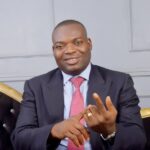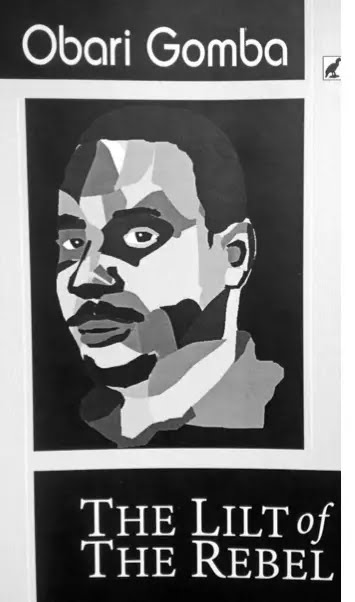By Adelana Esther
Abstract
Man’s quest for truth, meaning and knowledge makes him seek for a higher force (a force beyond himself) to depend on. However adventurous this seems, it’s pitiable that he neglects common sense in his quest for the truth. He accepts religious dogmas and refuses to question it. Any attempt to do this is seen as heretic and blasphemy by the religious sects’ leaders, who have almost become a demigod to the poor and vulnerable. Obari Gomba’s The Lilt of The Rebel is the oppressed response to these tyrants. It audaciously raises its voice against religious dogmas, people, race, traditional beliefs and social-political systems that oppresses the common man. It questions situations that the society considers as the mystery of the universe and establishes state of mind that the same society considers as heretic and rebellious to the norm. In The Lilt of the Rebel, we are encouraged to seek for meaning and fulfillment in self, rather than making gods and making them Gods. The theory that underlines these lines of thoughts is the egocentric theory of self-transcendence. Hence, this study discusses egocentrism in contemporary literature; reviewing and analysing Obari Gomba’s The Lilt of The Rebel. The study employs the egocentric literary theory as its theoretical framework, and exposes self-transcendence as inherent in the lines of the anthology. The study also presents an analysis of each part of the anthology, and its thematic preoccupation.
Keywords: Egocentrism, Self-transcendence, Contemporary, Literature.
Introduction
Self-transcendence is a process in which we experience ourselves. It is self-realization. Religiously it translates into sin, but it may also be regarded as a natural, inevitable manifestation of consciousness and self-consciousness. The egocentric view of self-transcendence was propounded by Friedrich Nietzsche, a radical and innovative philosopher, renowned for his proclamation of the death of God. He declared that “God is dead” because of the change in the value of people. This is exemplified in the parable of the Madman in book one of The Gay Science:
“Have you not heard of that madman who lit a lantern in
the bright morning hours, ran to the market place, and
cried incessantly, “I seek God! I seek God!” (Section 125)
One of the noteworthy features of this scene is that the loss of the belief in God has already become a part of the public world. In a bid to free man from his depressed state, Nietzsche brought to the consciousness of all the fact that man must abandon or eliminate the idea of God, and religion. Nietzsche suggests we get rid of the conceptions of God and sin, and live intellectually and independently. In Obari Gomba’s The Lilt of The Rebel, we found poems that reflect this theme. This thematic preoccupation is found in parts of the anthology titled, “….We Make Gods and We Make Them God”, “…If You Ever Cross the River”, “The Universe of The Unfree” And “…A Curriculum for the Oppressed”. (Obari, 2021).
Everyman innately seeks for satisfaction and fulfillment – some finds it in self, and others find it in something beyond themselves. Like Frederick Nietzsche, the poetic personal, Obari Gomba, in his The Lilt of The Rebel, encourages man to find satisfaction in self. He emphasizes the reality of humankind, as ever searching for God, but never finding him. This restless state of man is resonance in poem, The Prayer Tree as thus:
“I am humankind: I have lost my head/ in search of the Gods,
/in search of Godheads/ I am humankind: I have lost my truth
/ in search of the many God’s that can never be known”.
(Stanza 4 & 6)
In contrast to this, the poetic personal vehemently declares his own fate, saying; “As for me, I have answered/my own prayer. I have found/ no deity on duty; so I have answered/ my own prayer/Life will she’d it’s foreskin in a second”. (Stanza 6; The Last Time). These declarations echo the thoughts of a self-transcendent personality. It in the light of Nietzsche’s theory of self-transcendence, that we shall review and analyse Egocentrism in Obari Gomba’s The Lilt of The Rebel.
Theoretical Overview of Friedrich Nietzsche’s Notion of Self Transcendence and Egocentrism
Friedrich Nietzsche is widely known for the popular phrase “God is dead” this proclamation has been misinterpreted as an affirmation of atheism – A concept that declares that God doesn’t exist. However, in the original intention of Nietzsche’s phrase “God is dead” lies his meaning of Self transcendence. His philosophy was only a way of making man look into himself for the discovery of his super powers, true potential and capacity for increased productivity in the society. In his book, Thus Spoke Zarathustra, the German thinker writes, “Man is something that has to be surpassed.” (Classic Ed.:42). What Nietzsche means is that through personal discipline, hardship, and work, an individual can surpass themselves, surpass their limitations, their fears, and whatever they want to overcome.
In summary, Nietzsche’s notion of Self transcendence is nothing but self-actualization, for self-construction. The phrase “God is dead”, hence means maximizing one’s full potential for becoming a better person, it also means enduring suffering and pains without looking for a divine power to help alleviate it. Nietzsche’s believes that pain, struggle and hardship are not things to avoid; they remain the necessary ingredients to a successful life.
Egocentrism as a literary theory is primarily concerned with self-transcendence and self-consciousness. It’s based on the theory of Friedrich Nietzsche. This theory promotes self-realization, and the rejection of religion in our search for truth and fulfillment. In the next section of this study, a review of Obari Gomba’s The Litl of The Rebel is done to ascertain the extent to which he has accurately reflected self-transcendence in his text.
Egocentrism in Contemporary Literature: A Review of Obari Gomba’s The Lilt of The Rebel
Obari Gomba’s The Litl of The Rebel, published in 2021 by Hornbill House of The Arts, is a hundred and ninety-five (195) paged poetry collections, of 109 poems on different subject matter.
The anthology is divided into 8 parts, each part exposing a line of thought. The first part which contains 16 poems contemplates on ‘..a lifelong art of fighting’. In this part the poet reveals his struggle on his part to perfection. He describes himself as a rebellious writer who was hardly accepted for not being English enough in his writings. He finds it difficult to rate his early works as good or bad, because of a standard set by man (the reader and literary critic) who isn’t even perfect enough to set a perfect standard for writers. He keeps Englishing his thoughts, despite the tyrannical view of the reader and critic whose literary view is subjected to his personal experience and mood. He feels the text and the writer can’t satisfy every reader’s taste. Hence, his thoughts; “Whatever happens, dear text, in/ death or life you cannot please every reader: perish the thought”. (Line 11-12; Some Text).
The poet, who is assumed to be a born rebel, finally accepts his fate as a lifelong rebel. As against the perfectionist – one who believes a great work of art must have a formal structure and content, he rebels against this traditional structure. He feels ‘Life’s purity attracts dirt’s’ (Line 10; I Have Burnt Poems) and finally turns ‘around to accept life, a little dirt here and there’ (Line 11-12; I Have Burnt Poems).
In the past, he burns his writings, because of what people would say about it. He was raised in a society of puritans – in form and in content. He was ‘raised to burn the erotica of Anais Nin’ (line 8-9), because of the erroneous religious belief that one who reads or writes erotic literature would end in hell, of course, the poet like everyone in his society wants to go to heaven but now, he prefers heaven, “the one between the things of the sky’ (line 18-19). The poet use of imagery in describing his acceptance of himself as a lifelong rebel is fascinating. He sees this as a lifelong fight because of the idiosyncrasies that exist in the society. Regardless of all these, the poet appreciates his works – past and present. He eulogies poems that has stood the test of time and commended them as being “…metier: the fire of a deep spirit” one that “inspire other spirits in a commune of songs” (Line 10 -13; Ode to Good Poems). The “spirit” being a symbolism of good poem is seen as a tool of civilization and mental enlightenment that “war against the blindness of the mind” (line 19 – 20; Ode to Good Poems).
The poet also gave a critique of bad poems. Though considered as bad, he appraised it for being the bedrock of his good poems. A great writer is like God, and just like God, he is capable of creating both the good and the bad. Thus, the rude expression of the bird in Ode to Bad Poems, “You are just like/ the God that has made you/…You/ are both makers of flawed things…/sometimes”. (Line 19 – 23).
These Ode reveals that the greatest of all creators, isn’t short of making mistakes, hence critics and readers should learn to appreciate the Beauty of The Wound (Obari, 2021). It’s noteworthy that, though the art of fighting continues, the poet has come to accept the fact that no work of art, is absolutely perfect, because “perfection, like perception, is often a dragon fire” (Line 4-5; I Have Burnt Poems).
The remaining parts of the poem titled, “…Beat Demons Out Of Each Hour,” “…We Make Gods And We Make Them Gods,” “…If You Ever Cross This River”, “…In The Universe Of The Unfree”, “…A Curriculum For The Oppressed” houses the poems that reflects egocentrism as it relates to self-transcendence in man.
The second part of the anthology contains 14 poems. It contemplates on the mysteries of the universe, and the courage to face life’s challenges, hence the title,”...Beat Demons Out Of Each Hour“. The poet, like Nietzsche, believes that pain, struggle and hardship are not things to avoid; they remain the necessary ingredients to a successful life. Hence, one must face them without fear. He encourages:
“If you are one of those at the edge/if you are one of those /
in the middle of extremes/if you are between faith and despair/
look up and look at the moon/and at the stars of your night.
/If there is no moon/and there are no stars, look/at your darkness sternly.
/Look at your darkness; it will cease to scare you.
/Beat demons out of each hour.”
(Those at the Edge; Line 1-15).
Looking deeply into the principles that underline these lines, one would see the egocentric theory of self-transcendence in manifestation. Once, the German philosopher writes, in his book, Thus Spoke Zarathustra, “Man is something that has to be surpassed” (Classic Ed.:42). What Nietzsche means is that through personal discipline, hardship, and work, an individual can surpass themselves, surpass their limitations, their fears, and whatever they want to overcome. It is evident in the lines of the poems above that the poet maintains the same point of view.
In the poem, Age to Age, the poet recounts how the struggles of life makes people grow older than their age – intrinsically, this implies that life’s challenges makes one wiser than his counterparts. This is portrayed in the lines:
“…Why are you growing grey too early? Is it life?
(Line7-8)
/… the battle we fought, /the battles we have won,
/the defeats we have overcame” (Line 16-18).
“Weeks later, our mother – visiting me in the city says,
‘I think you are greying/too early like your father’.
Her words have a new meaning… altogether.”
(Age to Age: 2021)
The other poems in this part reflects themes of creation, maturity, brokenness, courage in days of adversity, humanity, fettered dreams and hope for the future. These themes also, are underlining themes of self-transcendence. Unlike the first part, the poems in this section are short, simple and have a nursery rhyme rhythmic nature. This structure shows the swiftness of time and vanity of life.
Also, in this part of the collection, the poet argues that, if only man would face his fears, he would discover that challenges don’t last long. According to him, people would last longer, if they don’t allow life’s challenges overwhelm them. These thoughts are in line with the words of the renowned philosopher and teacher, Dr. Robert Schuller, who attested that, “tough times never last, but tough people do” (Dr. Robert Schuller: 175).
The poet further argues that, if one must die, because the challenges of life are overwhelming, such death should be, when he is still standing tall. This is seen in the extract below;
“To look at your mistakes/and know them as they are,
/ to look each one on its forehead,/to beat each forehead
/and make it fish blood.
To wake up by the roadside/ of your dream,
/to heal your wounds./before they fester and run,
/ even if they fester and run.
To stand up and walk/because you know/that if you are to die,
/ you must not die/with your back on the floor.
You look at yourself/because you know that
/ a man must die on his feet.”
(Stanza 1-4: For on Your Feet)
The third part of the anthology contains 18 poems, each echoing self-transcendence, metaphysical and theological issues that resonate to the title, “...We Make Gods and We Make Them Gods”. This part questions religious dogmas. It questions the certainty of afterlife, and boldly criticizes the oppressive practices of religious leaders. This part also reveals the hate, injustice and hypocrisy expressed by religious fanatics, “they define the road to hell or heaven through ones skin colour, purity or foulness of tongue/the light or darkness of geography” (Line 21-22; My People Say).
The (Western) religious leaders discriminates the people based on their skin color. They promote racial discrimination and segregation, instead of love. The (Arabian) religious leaders, who are supposed to protect the masses, kill the people as a divine mandate. Not only did these religious leaders discriminates and kill physically, they kill the people psychological and make them follow their selfish biddings without thinking. They covet their land and riches in the name of divine duty. They rob the people in God’s name and tell them lies “to shape the myths/it spins as facts”. (Line 19-20; To Meet God In The Unknown).
The poet’s antagonism of these practices is an act of rebel against religious institutions, especially in a society where the political structure and economic system is deeply influenced by religious beliefs and authorities. The masses feels that a supernatural force must always be depended upon if success must be attained. The religious fanatic criticizes and discriminates those who do not belief in their faith. They justify their deeds by killing. These are act of people who are zealous without knowledge. Should one kill to defend the God he serves? Is the God incapable of fighting for himself? They call those who do less for God ‘candidates for the fire’ (Stanza 5; Three Surprises).
The poetic persona, in Three Surprises exposes the shock these fanatics would experience on the last day. According to him, those classified as hedonist and lost souls would have a mansion in heaven, and the fanatics would be nowhere close to heaven and the vilest of the dinner and rebel would be God’s right hand man. He lamented their fated in the lines below:
“One -that I live in
My mansion there.
Two- that you are not there.
Three – that Bob Marley is sitting
at the right hand of Jah,
(which is no surprise to Jah’s people)”.
(Stanza 4; Three Surprises)
This third part of the anthology also uncovers the metaphysical part of man – His Soul. Religious fanatics believe that the purity or foulness of the soul determines man’s eternity. While man considers the soul as his most sacred part, the Chicken in A Chicken Defines the Soul, considers the soul as the part that stinks the most. This is seen on the extract below;
“Chicken: What is a soul?
Man: You see? Dumb?
Chicken: Of what use is a soul?
Is that not the part of you
That stinks the most?”
(Line 1-5)
The sacredness and stink of the soul is juxtaposition – an oxymoron. It emphasizes that the things we really extol are not really worthy of exaltation. This too is rebellious. It’s rebellious to defame what is considered sacred in the society. However, the Chicken’s assertion is true. It reveals the death of God and religion, marked by the moral decadence in today’s world.
The stink in man’s soul is evident in his manipulation of people. Even those who claim to preach Jesus Christ have turned him to a “blue chip enterprise in the stock market” (Obari, 2021). They take money from people in the name of fulfilling a divine duty, but deep down in their hearts they know they’re nothing but robbers and scammers.
In the closing part, the poet invites Jesus to fight for and defend his name that has been used by the world in defrauding people.
The world loves to rob and to kill
in your name. But their actual hides
are Hate, Greed and Lust.
So they drag you into the league
of their gods. They make you preside
over false righteousness.
(To Jesus 2; Line 11 – 16)
The poetic persona in his letter to Jesus, expresses his dissatisfaction with these religious fanatics who rob and kill in his name. He impatiently, counts his days of waiting on Him and recounts his desire to see Him fight those who defraud people in His name.
Again, in the same verse, we saw self-transcendence in display, when the poetic personal declares that he only desires that Jesus defends his name, not that he knows any faith or serve any god except kind. This is found in the extract below;
“You know I defy every god;
I defy their gods. I think it is time
to rise and fight.
It is time to yank off the heads and the limbs
of their gods.
It is time to scatter those dead things
in the crannies of their vain unbeing.
You know I know no god except kindness.
I serve no god except goodness.
I know no fear and no faith; I know the grace
that is at war with the gloom of the world.
I pray it puts great light in the firmament.
Let us rise and put some light in the world.”
(Stanza 2; Line 17 – 29; To Jesus)
Despite his anger against the acrimonious act committed in the name of divinity, the poetic persona in Before Nightfall and The Autobiography of Professor Roughead embarks on a search for God – though God has been misconstrued and misrepresented by men, but he still believes that there exist a God somewhere, not the one made by men, but the one who “loves to hide behind the Clouds” as the Devil describes him in the poem.
In the poem, The Autobiography of Professor Roughead, the poetic persona had given his life to the Devil and had it rejected, because he was ugly. In mockery of God, the devil responded; “Give it to God; /he loves ugly things’. This declaration of the existence of God, by the Devil confirms the existence of God. Although, atheists deny the existence of God, the devil confirms His existence and hopes that man finds God in goodtime. This is sarcastic! Does it mean that the Devil is easily accessible, but God keeps hiding behind the Clouds far away from man, because of the stink in man’s soul? If the stink in man’s soul bonds him with the Devil, does it imply that man’s soul must be pure for him to find God? Or does God accept man as he is and then purifies his soul? These are the metaphysical questions raised in the poems in the third part of the anthology.
At the end, the poet journey on his quest for God was futile, because he didn’t find Him. Instead, he decided to find himself and focus on his superpowers, like Nietzsche advised man to do in his theory of self-transcendence. In the lines of Inside the First Temple, the poetic persona recounts his sojourn on self-discovery. He realizes that, though he doubts divinity, he couldn’t live without God in the world. This made him to embark on a self-construction journey, which is the first process in self-transcendence. Having built himself to an extent, he announces that he has found God in himself – his mind and attested that “It has nothing to do with religion…it is the best we can become”. Also, his bold declaration, “I have rebuilt the First Temple – my mind. / I have put God in the First Temple/…it has nothing to do with religion…it is the best we can become”, is in line with Nietzsche’s believe that if man must come to the realization of true self and fulfillment, he must eliminate the idea of God & religion, and focus on his superpowers. He believes that the solution to man’s problem is embedded in man, if only he would maximize his true potential.
In Evidence of The Body, the poetic persona questions the credibility and authenticity of afterlife and the religions promise to save the soul. The religions promised that man’s soul would be saved after death, we don’t know if this too is a form of deception or another lie from them, but one thing is sure, ‘…the religions are smart/ they only promise to save the soul./…. the unseeable, /the untouchable, the unknowable,/the unprovable./ The religions avoid the stark body…” (Stanza 4-6). “The religions do not promise/to save the body; they know they cannot save it.”
Following this discourse, the poetic persona argues that religion has played smart on us. According to him, these religions knew one has to die to confirm the truth of the salvation of the soul. These further raises metaphysical questions in the mind of the reader, such questions like; ‘Why did religion promise the salvation of the soul, instead of the body, the part of man that is visible to all?’ are elements of egocentrism. The poetic persona claims this is a religious fraud, since the only way to know if the soul would be saved as they claim is to die. “You have to die first…and lose the power to prove anything” (Evidence of the Body: 20-21). He argues that, if only man could save himself, he wouldn’t have to wait on promises he’s not sure of until he dies. Again, these lines of thoughts resonates elements of self-transcendence. The unverified promises of religion, could it be another lie told by man to himself, because he feels he is not self-sufficient. What if this is another religious myth and dogma masquerading as truth? Then would the words of the poet be justified that “…We Make Gods and We Make Them Gods“?
Although the poet did not categorically state that man should let go of religion or the idea of God like Nietzsche stated explicitly, his philosophy of finding fulfillment in oneself and his questioning of religion, the afterlife & the salvation of the soul, reflects themes of self-transcendence. Again, his writings are The Litl of The Rebel, questioning aged longed beliefs, religious dogmas, systems and ideologies that the society is silent about.
The fourth part of the anthology speaks of death and the desire to know what happens after death. In Talking to The Dead the poetic persona went against the norm by asking questions like; How does it feel to be (dead) out there…? What do the dead know? How do dead folks live outside the life we know? These longings to know the lifestyle and grief for the death of loved one underlines the lines of the eleven poems in this section.
Humanity believes that there’s an afterlife, religion gives us hope by promising the salvation of the soul, but this is uncertain, until we die to confirm the validity of their claims. What if there’s no afterlife? What if religion has no power to save the soul? This is a question that people are too afraid to ask, not only because they fear to be tagged as heretic and rebellious, but because it would bash their hope for living. The poetic persona encourages that while we hope for living, we should enjoy our stay in this life, because “there is nothing as sure/as the flesh…inspire of its dead ends’ (Line 20; Talking to the Dead).
The lines of the poem, Memory is not Enough, are deeper than it surface meaning – it’s ironical that neither God nor medicine could save the human body, as justified in the death of Victory Collins, the poet’s acquaintance. The poet mourns that…”neither God nor medicine/could save… /Death mocked at our prayers and everything. / I still carry your death Certificate/with me everywhere/as if to constantly shove /it in God’s face”.
These lines reflect Nihilism, if God or medicine could not save man, what then is the fate of man? Who does he look to for help? The power of death is magnified as one capable of breaking the poor and the rich, the mighty and the weak. Time being symbolic of death: …`breaks the poor and the rich /Time breaks the mighty and the weak. /Time makes dust of all humans’ (All Dust: Stanza 7).
The fifth part of the anthology, titled; …The Dots Between Viral Spots, speaks of the events that happened during the global pandemic and the lockdown. It tells of “the unethical system without basic protection for anyone”, and the global grief & anxiety that pervades the period, while unveiling the theme of hopelessness, fettered dream, pandemic & diseases, death, corruption, anger & loss. In Policing the Pandemic, Medical personnel were molested, beaten and dragged for breaking the lockdown policy, all because they wanted to save sick persons who were denied access to healthcare during the lockdown. The law implementers who are supposed to protect the sick, kills them instead. A few days after Goerge Perry Floyd recovered from Covid-19 he was killed by the police in the Powderhom Park area of Minneapolis.
In “…Every Dawn Calls Us To Rise“, the sixth part of the anthology, the poet, like the wanderer in the medieval poem, ‘The Wanderer’ eulogizes the state and its people. He uses metaphors to describe the landmass and the unique features of each state. ‘In Lines On Ten Places” the poetic persona magnifies the beauty, culture and people of Eleme, Portharcourt, Benin, Onitsha, Aba, Enugu, Maiduguri, Ilorin, Yola and Ibadan. Despite the corruption in the system, the massacre of innocent youths at Lekki toll gate, and the religious and tribal conflicts existing in the country the writer still believes in the state and concludes that “a city endures where the people endures.” Thus, encouraging hope in the midst of adversity.
The seventh and the eighth part of the anthology titled; “…In The Universe Of The Unfree” And “…A Curriculum For The Oppressed” respectively, speaks of theme of oppression, lack of freedom and revolts. The first part unveils the reality that no one is really free. Both the oppressed and the oppressor are not free. The universe itself is not free. “…the universe will never be free/ from the wrongs of those who hold/others down’. Underlining these poems this part are the theme of racism, social stratification and injustice. The poet demystifies the myth of freedom. He argued that there’s no freedom anywhere and warns against those do nothing when evil befalls their neighbors and those who preaches that freedom is a state mind. The whites are not free, the blacks are not free; all humans are “slaves of the Earth”. Though many leverage on others weaknesses and ignorance for fulfillment – the police officers & soldiers kills and rapes in the name of protecting the state, the magistrate and judges sends the weak and innocent to jail, the preachers becomes rich from the sweat of the poor – in all they aren’t really free.
The last part of the anthology reveals that rebellion is God’s gift to the oppressed. In No Gaslighting the writer sees racism as a war that would never end. He had written the poem in Seattle, at Elliot Bay Book Company after a conversation that questions his Identity. He boldly confronted his struggles by speaking up. Like the poetic persona, when we are confronted by challenges or when things aren’t going well in the society, we should not be silent, rather we should speak up! If we must see change in the society, we must “talk back, shout back,/write back, fight back”.
The poetic persona argues further, “Tyranny only survives on your inaction/ or inadequate action. / A tyrant is counting on your fear, or / on your failure to stay in the fight”. (Stanza 8: A Tyrant Is Counting On You). When the oppressed rebelliously fights back he gains his loss. In rebellion lies the power of the oppressed.
Hence, Obari Gomba’s book, The Litl of The Rebel is a common man’s response to the corruption inherent in the religious, Political, judicial and social system of the world. Like Friedrich Nietzsche the book encourages man to courageously determine his fate, even if it requires an act of rebellion against what is held in high esteem by society. Nietzsche believes that pain, struggle and suffering is inevitable to man. He sees them as necessary facilitators of a successful life. This is the basic principle of Self-transcendence, facing ones pain oneself without looking up to a higher power for salvation.
In the collection, the poem, A Simple Act encourages that rather than becoming victims of oppressors, and the struggles of life, rebel! According to the poet, this should be our typical response to oppression and oppressors. “When you realize / that power/ has designed/to keep your head low or down, you/ teach yourself/ to raise to your head. When life seeks/ to make you sad, / you must teach yourself/ to be glad./All you need is “…your simple act of rebellion”. (Line 1 – 11: A Simple Act).
Conclusion
Like Remi Raji a Professor and the Winner of ANA/ Cadbury Poetry Prize rightly said, “Obari Gomba’s poetry illustrates the wedding of hope and defiance, the courage to live and survive the mystery of the universe”, Obari fearlessly penned down his thoughts regardless of being criticized. His questioning of what the society holds sacred, and feared to question is worthy of emulation by modernist poet. He did not only ask questions, but provides answers to these questions in the lines of his poem. Just like every metaphysical poet, Obari Gomba’s poems are intellectually inclined, than emotional. Brilliantly crafted, and well strung. His collection of poems reflects the struggles of man amidst political, religious and social corruption and provides answers to man’s many questions. It over-glorifies the notion of self, encourages self-realization through hardship, struggle and adversity. He spoke vehemently against religious dogma, the status quo and stereotypical cultural identity, promotes self-idealization, by presenting man as heroic, as opposed to the flawed and imperfect picture associated with his identity. These and more is the core of Egocentrism which are found in Contemporary African Literature.
Works Cited
Nietzsche, Friederich. (1979). Philosophy and Truth: Selections from Nietzsche’s Notebooks of
the Early 1870’s. Edited and Trans. Daniel Breazeale. New Jersey: Humanities Press
International.
Nietzsche, Friederich. (1954). Thus Spoke Zarathustra: A Book for All and None From the Portable Nietzsche. Trans. Walter Kaufmann. New York
Nietzsche, Friedrich. (1974). The Gay Science: With a Prelude in Rhymes and an Appendix
of Songs, Book 1. Translated by Walter Kaufman, Vintage.
Obari Gomba. (2021). The Litl of The Rebel. Lagos. Hornbill House of Arts.
R.H. Schuller, (1982). Tough Times Never Last, but Tough People Do! Rev. ed., Burbank, CA,
Word of Faith.

SHORT BIO DATA OF THE WRITER:
Adelana Esther an author of 6 books, Researcher, Cultural Administrator, Literary Critic and Public Speaker. She is a graduate of English from Ambrose Ali University. She has a Nigerian Certificate in Education, and She is currently undergoing a postgraduate studies in Cultural Administration. She is the Public Relation Officer of the Association of Nigerian Authors, Abuja Chapter.












